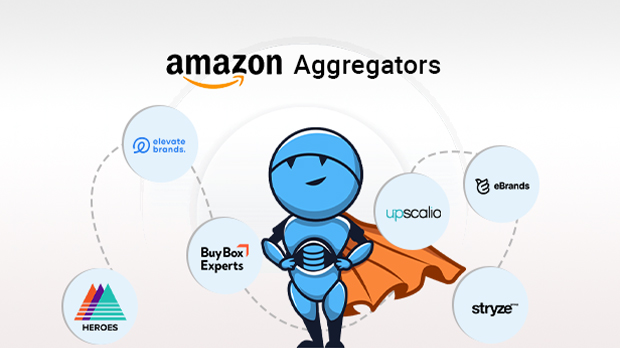Amazon aggregators are popularly called Amazon Acquirers or Amazon Consolidators. They mainly work to search for small businesses both on and off Amazon which they can negotiate and acquire to gain revenue by doing business. They acquire businesses and provide the resources and energy to help build a successful and profitable brand that can expand worldwide.
Amazon Aggregators operate as investment firms with large financial resources to boost and help buy small Amazon businesses. They have the expertise and work smart, a conglomerate of e-commerce experts, Amazon veterans, and the brightest minds in the industry optimize data by applying their knowledge and expertise in logistics and marketing to drive revenue and scale these small businesses.
The top aggregators in the game are proving to be well-funded, professional groups with the ability to turn the brands they acquire into global businesses. The experts in the aggregator companies have an eye for detail in selecting the right businesses thanks to their SEO (Search Engine Optimization), Knowledge, and expertise about Amazon businesses.
There are 92 active Amazon aggregators around the globe at present. Of them, about 53 aggregators have announced funding rounds, of which 32 have successfully raised at least $100 million. Most of these aggregators are based and operate in the United States; But there are some companies that are operating in Canada, China, Belgium, India, France, Israel, Finland, Germany, Mexico, United Kingdom, Japan, Portugal, South Korea, Singapore, Spain, Switzerland, Turkey, The Netherlands, UAE, and Luxembourg.
As far as Amazon FBA aggregators are concerned, 2020 was a successful year for them. The Fulfilled by Amazon (FBA) Service allowed small firms to be built into successful businesses, and investors spent an estimated $1 billion buying them up.
In the year 2020, the market had a breakout year because of three factors, namely, the pandemic accelerating spending on Amazon, Thrasio raising hundreds of millions of dollars, and Anker, an Amazon-native brand, going public. With a value of over $1.6 billion, Thrasio became the first company to attain unicorn status in the year 2021. Since most of these firms are listed on a stock exchange, it is impossible to predict the outcome of these transactions. Even if the specifics aren’t known, this positively impacts the market.
Meaning of Amazon Aggregators?
An Amazon Aggregator refers to a business that acquires multiple Amazon brands for the sole purpose of consolidating them under the same roof and later provides favorable conditions and platforms and enables them to grow significantly.
A camping cookware brand, a tent brand, and one that sells sleeping bags are all independent Amazon brands. Independently, they’re doing well. They’re selling a lot, making a lot of money, and their products are getting great reviews. For an aggregator, offering these three goods together is the best way to maximize profits since they are all tied to outdoor gear sales in some way or another.
What factors do Amazon Aggregators consider while making an offer to a Brand?
Aggregators conduct comprehensive research before selecting and making an offer on a brand. They sift through the thousands of potential brands with reliable technology, using data science to browse and scan Amazon and determine the best investment options. The ecosystem, international access, and impressive consumer base that Amazon provides offer an extremely solid foundation for businesses to expand massively when taken under the wings of knowledgeable consolidator companies.
Aggregators use tools for each part of the due diligence process, which, in combination with the trained eyes of the employees, helps them determine the best businesses to acquire. Amazon Aggregators pay attention from scanning reviews to examining trademark registries and anything that may indicate violations of Amazon regulations, these aggregators know how to avoid black hat tactics and focus on the businesses with the most promising potential.
Aggregators are primarily looking for the following criteria when hunting for the best investment options:
- Brands that are registered and selling their own branded, private label products
- Brands that are marked as Fulfillment By Amazon (FBA) – make for simpler logistics and a higher probability of qualifying for Amazon Prime Status
- Promising reliable profits and margins- while there is no set minimum for these figures, most aggregators are looking for at least $200k annual net profit and usually around 10-15% net margins
On top of that, profit margins will be scrutinized. There must be a reasonable profit margin, at least 15 percent of the net margin falls within this category. Some may be ok with 10%, but never less than 10%.
How many SKUs (Stock Keeping Units) are needed for Amazon Aggregators?
When it comes to SKUs, more isn’t necessarily better. Just three or four SKUs would be preferable to 60 SKUs in terms of income generation for aggregators.
What optimum sales made via Amazon are needed for Amazon Aggregators?
Many Amazon merchants also offer their products on eBay, Etsy, Walmart, Shopify, etc in addition to Amazon. And that’s perfect in terms of increasing the sales volume. But aggregators are particular to know about the proportion of orders made via Amazon concerning the orders made on other platforms. Is there a magic number that merchants must reach to be considered legitimate? The aggregators have some say in this. Some need a minimum of 75% of sales to be made on Amazon, while others are ok with a lower percentage of sales.
What is Timeless Demand in relevance to Amazon Aggregators?
It is essential to grasp what aggregators do not want to comprehend what they want fully. Product categories that may be called “fads” are not desired by Amazon aggregators in this instance. They genuinely look for firms that will be profitable in the long run (AKA products that will be in demand for years to come).
- Customer Loyalty
- Niche
Customer Loyalty
Customers who return to buy again and again are fantastic for business. Consequently, you will have far greater negotiating power if you already have a large and committed loyal customer base.
Niche
Most of the aggregators are particular about what they’re searching for in terms of content. They are often looking for niche items to target inside a specific market that they have in mind.
What are the factors that make FBA (Fulfilment By Amazon) so desirable to Amazon Aggregators?
Amazon FBA businesses are easy to manage, even after being transferred to another owner because logistics and shipping are already in place with a trustworthy and reliable system like Amazon.
Amazon Aggregators prefer to experience and operate to have the most seamless transfer possible when they plan to acquire and assume a new venture, which makes for a smoother process, both on their part and on that of the seller who wishes to sell her business.
They very much appreciate if there is a well-established system having the needed infrastructure and proven and post-sale it doesn’t need any tweaking and an FBA business give the guarantee that the aggregator will never have to deal with any third-party logistics. So, this gives your seller business an added benefit in the eyes of desirous and prospective buyers.
Firstly, they do not want to deal with the inconveniences of packing goods for shipment and returning them after purchase. Secondly, they want to be eligible for Prime status, which is much simpler to achieve if you use FBA services. But it’s more complicated than that. According to Marketplace Pulse, FBA is used by 82 percent of the top Amazon sellers, so that is considered.
What are the terms and conditions set for merchants by Amazon Aggregators?
Amazon maintains the right to delete accounts that breach the company’s terms of service. As a result, aggregators are only interested in merchants who all adhere to the laws and regulations.
- Location
Most of the prominent sellers are concentrated in the United States. However, many have migrated to other markets, like Canada, Mexico, the United Kingdom, other European Union nations, and other countries as well.
Most aggregators prefer and would feel happy to acquire brands that have successfully maneuvered the challenge of operating and selling in diverse locations and marketplaces and a few are even located abroad, a name to reckon with is Olsam, the UK-based largest aggregator, and Accel Club, which was first launched in Russia and presently headquartered in Amsterdam. If you are an internationally based seller or have a well-established and sizeable business to boost about which will be selling outside the U.S., these aggregators will be the best bet and good fit as a prospective buyer for your brand.
What Should you do if you want to sell your Amazon Business?
If you’re still uncertain, consider asking the following questions to yourself:
- What should the sellers consider while selling their businesses?
- Do you have the skills and certifications that aggregators are seeking?
- If not now, when will it be?
What should the sellers consider while selling their businesses to Amazon Aggregators?
Aggregators know that many small businesses on Amazon are promising, and they do their due diligence, not only to make sure the business is a good fit for them but also to ensure that they can care for the business as if the company is its own since inception.
Aggregators know how online businesses should be run and, thanks to their size, can absorb and save costs too quickly to become profitable. As soon as an aggregator acquires a business, they first determine how to increase the inventory to expand into the EU and Australia.
They apply their logistics experience and knowledge to determine the necessary adjustments to save on shipping costs, develop an advertising strategy and examine SEO possibilities. This helps them to scale businesses and turn profits much quicker than any individual small business could manage on their own.
Of course, there are always challenges, as with any business. But thanks to the size, funds, and expertise of aggregators, they are much better equipped to handle them. The likelihood of an aggregator business surviving a blow is much greater than if an individual small business faced that same risk.
So, if you think that you have all the capabilities to successfully run your business you can run on your own. If the business faces any infrastructural problems and facing a financial crisis, it’s better to sell to Amazon.
Do you have the skills and certifications that aggregators are seeking?
If you have the necessary skills and needed legal status, that’s fantastic and you can sell it if you are ok with it. You are required to make modifications to enable your company more appealing to customers.
If not now, when will it be?
As previously said, it is a seller’s market, but this may not continue to be the case indefinitely. Consider the repercussions of not selling right now. Do you have the time, money, and resources to expand your firm and compete with aggregators in the future course of time? Do you have the resources to compete with aggregators now and in the future? Will your company’s net worth is likely to rise in the future or drop due to your decision to wait and watch? When it comes to purchases, timing is everything.
What Amazon Seller Aggregators Look for When Buying Business?
No two Amazon seller aggregators are the same in each aspect. Each one of them is searching for something different from the company of a third-party vendor. However, there are a few similar denominators among them. You’ll often hear an Amazon Aggregator representative say the following must-haves:
- The capacity to defend one’s position and maintain one’s position through time
- Fulfillment
- Channel
- Size, expansion, and profit margins are all critical considerations
- Inventory size
- Category
- Loyalty
- Reliability
The capacity to defend one’s position and maintain one’s position through time
It is all about having a patent, utility, or design patent. Sellers must have a PL (Product Logo) or a registered trademark.
Fulfillment
FBA sellers have a distinct edge since aggregators vie for the Prime designation.
Channel
Amazon aggregators favor MCF companies (Multichannel Fulfillment companies) that have a presence on other marketplaces like Shopify, eBay, Etsy, etc. However, they anticipate that Amazon will account for a major chunk of sales.
Size, expansion, and profit margins are all critical considerations
As previously said, this will differ between one aggregator to the other and it is not necessarily fixed in stone as well. However, a net profit of $200,000 per year is a decent starting point, and profit margins should be 15%.
Inventory size
In general, the less SKU (Stock Keeping Unit) you have, the better it is for you.
Category
A few categories are off-limits to most Amazon aggregators, such as electrical devices, accessories, fashion, supplements, perishable items, and seasonal items. Those who like to work with evergreen items, like those in the following categories: health and household, home and kitchen, arts and crafts, sports and outdoors, pet supplies, and baby products, find a favorable market space.
Loyalty
Returning customers, subscription boxes, and a good sales history project a promising future.
Reliability
As you would assume, Amazon seller aggregators prefer to deal with sellers who always read the finer details, understand the regulations, and follow the rules (i.e., sellers who do not have their accounts suspended or are subject to ongoing IP infringement accusations).
What Should The Sellers Do When Dealing with Amazon Aggregators?
Whether you want to sell your company to an Amazon Aggregator or compete with them, it’s in your best interests to make it seem as professional as possible. In this process, you must always try to increase your sales by conducting campaigns and by offering special deals. This will help in leveraging those statistics and thereby a favorable chance of an increase in the value of the business. However, there needs more to be done than what you can do now:
- Establish your brand’s identity both on and off Amazon.
- Develop social media presence (e.g., run PPC ads, work with influencers, etc).
- Take advantage of Amazon’s business reports.
- Make sure your listings are optimized.
- Revamp your A+ material to make it more current.
- Check your IPI (Inventory Performance Index) score as well as your FBA (Fulfillment By Amazon) inventory levels.
- Try to get a maximum number of positive ratings and comments.
- A performance rating on a scale from 1 to 10 means more points for you.
- Keep inventory levels up to date.
- Increase the accuracy of your performance measurements.
- Investigate other distribution routes (Etsy, eBay, Shopify, etc.)
- Locate an investor who is willing to provide a last-minute capital infusion to expedite expansion.
What Happens After the Sale Is Completed?
Amazon brand aggregators make their presence felt as soon as possible to enable the company to turn its fortunes around. They begin with listing optimization, concentrating on keywords and search engine optimization (SEO). After that, they move on to branding (images, presentation, packaging, etc.)
Some Amazon aggregators are unwilling to budge concerning writing non-compete agreements with their customers. Depending on the specialty, they might be for specific categories or niches. These will be off-limits for as long as they feel they are necessary. Additionally, some companies allow previous owners to continue working with the firm in an advisory capacity.
That’s all there is to say about Amazon aggregators at this point. An important aspect to highlight here is that the Amazon seller aggregators are growing at an alarming rate. Amazon vendors will face a lot of setbacks in the future due to this aspect.
Aggregators act as a means of bridging the gap and act as a connecting link by providing more lucid information between the present conditions and more incredible things in the future. In today’s market, most of the transactions are modest, involving firms with annual revenues of less than $1 million, making them unlikely acquisition prospects for FMCG behemoths.
Aggregators suffer when they overlook several problems
As acquisition costs rise, they must acquire and establish prosperous and long-term companies into a surprisingly diversified range of brands. Furthermore, many of them are run by seasoned investors with no e-commerce experience and rely on outside professionals to expand their acquisitions.
Small business owners are frequently focused on getting their items to market, which results in high customer acquisition expenses and limits their potential to grow their product ranges. Aggregators must promote recurring business by investing in marketing and the user experience over the long term. These initiatives should also involve data-driven product ideas to improve client loyalty and provide more purchasing possibilities.
Conclusion
For a start, Amazon Aggregators are promoting entrepreneurship by offering financial incentives. In their absence, vendors could only turn to their earnings for compensation. They were often operating out of their homes and garages, which resulted in inherent inefficiencies that hindered their ability to expand. Now, aggregators are rewarding them for their efforts and providing them with the opportunity to try something new.














